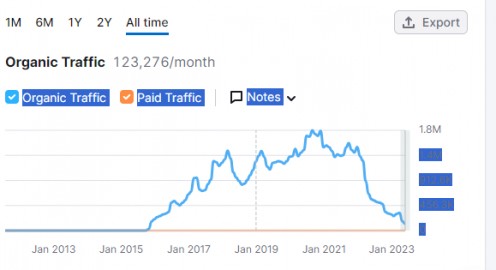The Decline of Dengarden
Despite being bad overall, the damage to the niches by the various Google algorithm updates over the past two years has been uneven.
While Pethelpful has suffered relatively less, Dengarden seems to have taken a huge hit. I've attached a graph of traffic from SEMRush as an illustration of how bad the fall has been for the entire Dengarden niche over the past couple of years.
The views for Dengarden climbed steadily after the niches were introduced. Then they kind of plateaued. Then, in 2021, they fell off a cliff.
My Dengarden articles have lost 95% of their traffic.
It's not just my own efforts that have been failing. Some of the success of my most-viewed articles came due to help from editors. Nowadays, it feels like the editors struggle to make anywhere near the same level of positive impact despite their best efforts.
I'm not sure what can be done.
Hi Paul,
It’s true that traffic has dropped on Dengarden and across the board on the HubPages verticals over the past few years. We are doing our best to address decreasing organic search traffic using a variety of approaches—increasing acceptance standards for niche sites to maintain higher quality, culling articles that are low quality or receive little traffic to improve crawl budget issues, keyword optimization/on-page SEO, and looking at technical optimization, among others.
Many sites have seen declines in organic traffic over the past few years due to Google’s algorithm updates, Google’s promotion of sponsored results, and the placement of features like “people also ask.” More recently, SGE (Google’s generative search) has pushed organic search results further down the SERPs, which has also presented a challenge. CTRs have dropped, even on articles ranking in the 1st or 2nd position, due to these issues. But rankings have gone down, too, and it’s frustrating to see lower-quality, less authoritative articles ranking above the high-quality articles on our sites.
The latest algorithm updates have been pretty tough on some of our sites, and we are continually working on new ways to improve traffic. Our best advice to authors is to hang tight while we try to improve the situation on our end. Take a look at your articles and research the primary keyword queries. See what’s ranking, make sure your articles match the search intent and include the content covered in those top-ranking articles. See what’s being asked in “people also ask” and “related searches” and address those questions. See if you can optimize for other relevant keywords or longtail keyword queries related to your article’s primary topic. Refresh your content; add new content. Interlink to other relevant articles on the site. Continually updating articles with very minimal changes just to refresh the pub date is unlikely to be helpful, as we have seen Google ranking older content (and they have expressed disapproval of this tactic directly).
When you write new articles, make sure you use a short, keyword-dense URL. Make sure your content is original and you have experience/expertise, and avoid saturated topics/keyword queries. See what kinds of articles you’re having success with and emulate those. I know many authors are aware of these strategies, but I think it’s good to reiterate. This is not something our editorial team can do across the board, given that there are more than 70,000 articles on our Network Sites. Please be assured that we are doing everything we can to improve traffic on our sites.
Take care,
AngelDear Angel, I get what you say in your reply to Paul and I'm appreciative of all the hard work you guys as editors put in to try and improve our articles when it comes to pleasing mighty Google but can I also add that the reality of the situation to me is plain and stark - people do not like the basic page layout because there's too little continuous text and too many ill-placed ads. Hence the general decline across most of the niche sites.
From my experience on Owlcation, where I've over 470 articles, the majority of which were top performers two and a bit years ago, tweaking articles just won't cut the mustard. We need radical action.
I'm still writing fresh material but am adamant that when the page layout changed back then the rot set in which means that I'm not expecting my newest articles to perform as they once would have done.Well, you are, in fact, an Angel. Thank you for taking time to give us some input; it is appreciated.
I do think ads and the layout are a big part of the problem. I have had messages sent to me that things are unreadable at this point. Some readers have run into those unattractive white spaces where ads are meant to load. They don’t like it.
It’s worth experimenting with the ads or different revenue programs to see if it can help sites regain traffic.
SEO magic can only go so far, and if you write long enough articles you probably check off most of the boxes on what appeals to SEO.There's just a huge traffic jam trying to load ads because of the number that try to load simultaneously if a reader scrolls fast to find information on a page. The lazy loading of images and ads can't cope with that. It's only suitable for slow scrolling. I wish they would at least load images first also, to lessen the number of whitespaces. Maybe they need to dump their servers in Say Media and get more up to date, faster ones.
Yes, I've wanted to explore content similar to mine from other Hubbers, and I've pretty much had to give up on it. The huge amount of ads slows my computer down so much that I cannot see any images or scroll smoothly through content at all.
Thanks for your response, Angel.
I understand that Google constantly shifts the goalposts and keeps creating new challenges for editors and writers.
I have no intention of walking away from the site. However, it is difficult to find the motivation to write and publish in the current environment.OK, but you're ignoring the elephant in the room. The ads. Ever thought of running a quick visitor survey? Ask them what they especially don't like about the articles?
Excellent advice Angel, thanks for this. I recently stumbled across a free SEO certification course by HubSpot. It takes a couple of hours to do, but I would recommend it to any hubber looking to know exactly how to improve existing articles for better organic traffic, and to write new ones with Google’s new algorithms in mind. It’s a very well laid out course with instructional videos and I learned so much from it. I’m now applying the techniques I’ve learned to my hubs and already seeing some improvement in rankings and view duration.
Would you check Exemplore? Mine has plummeted over the last few weeks.
I actually wasn't actually affected much by the last core update. My traffic dropped initially but then went back to more or less what it was before.
It may well be that certain niches were affected more than others. It's too early to tell from looking at SEMRush.
Right now, I'm getting a few surges, often a sign that Google are doing tests before they launch another update.
It's difficult to figure out what's happening nowadays as the updates are so frequent, they often overlap. They've gone from two or three per year to two or three per month!
The only predictable thing is that updates are never good for HP, if the last two and a half years are anything to go by.Which suggests that there's something about the sites that Google doesn't like and isn't being addressed. So either ads or slow loading. Hubpages know about the slow loading of ads or images since they've added the "content continues below" text. (Or maybe the function of that text is to avoid confusion amongst readers, differentiating between text and ads?)
I have an older computer, so when the ads are trying to load and the video is running, I get "This page is not responding" popups, which make it impossible to read the article.
I close the popup and another pops up immediately. I have this problem on Pet helpful, and occasionally on other sites, but always on Pethelpful.
I tried reading another authors PH article and finally had to give up. I had clicked close on the popup 25 times in a row, and was unable to scroll further down. That is a serious problem for folks with older computers.It takes a minute for images and ads to load on my 6 year old phone, and I've got a 100 Mbs connection which is plenty fast, so it's not the broadband speed that's a problem. It would make sense to reduce the number of ads, but maybe they've no control and it's either all or none? I would have thought they could specify the number and they get distributed evenly.
On Sports Illustrated it's 1 ad per 18-20 lines of text. here it's more like 1 ad per 8-10 lines of text. So I would expect that they could choose the SI.com ad layout, but choose to burden HP readers with twice as many ads.
I think they can chose as well. I've seen ads every 3-6 lines of text, depending on the article/niche site. It appears they are experiementing with ads again. It would be great if we could have better consistancy and less ads.
Have you seen the new "ads"/sponsored content floating around? Pethelpful is the most egregious one I think. It's huge and a sponsered story by IAMS and links out to a different TAG channel page (Parade Pets). They do a good job of hiding the fact that it's an ad. If you miss the small advertisement print, it's easy to think it's a recommendation from the author. The big blue print "sponsored by IAMS + PARADE should probably help make it known that it's an ad, but I was confused at first. Maybe being an ad makes it okay to essentially link out to a subpar site. As far as I can tell, it's not any better than HP ever was.
I've seen them on Delishably and Dengarden as well, but they are much smaller, surrounded by a bunch of white space, and not on every article. They go to Men's Journal and Powder, both are TAG channels per the Arena Group's website. The ones on Delishably create so much white space it keeps pushing the page farther down and it's impossible to read the rest of the article.
Anybody can look at the ads and say: I don't like the ads. But what if a certain level of technical know-how is needed to understand the underlying SEO problems?
A lot of SEO is not even on-page and requires specialist knowledge because it's focused on things such as how sites are structured and how they're geared towards search engine crawling.
I don't know much but I think I know that much.
While I can see the appeal, it doesn't seem logical to assume that the issues must be obvious and understandable to someone with little or no advanced computer or advertising experience.
If anything, I think the opposite is actually more likely and the problems and solutions probably aren't simple.
Figuring it out also likely also requires going "under the bonnet/hood."
That's why I keep an open mind.
Plus it kind of doesn't matter anyway, because none of us are involved with the technical and advertising side of the site. We just write and publish.
I suspect that the staff who do that stuff don't even read these forums.SEO is likely a part of the equation. It's hard to think the ads and layout aren't hurting traffic at this point. I know most people won't stay on sites that are littered with ads, and it doesn't make you want to come back. When ads are too intrusive, they can make a page seem spammy rather than helpful.
I actually believe that it's extremely unlikely that they'd deliberately reduce revenue. That's not how businesses work.
So we're left with the incompetence explanation. That just doesn't seem likely to me either. I think TAG will have people with the necessary skills and expertise to do their jobs to a certain level of competency when it comes to maximizing revenue.
That necessarily means taking into account SEO considerations when adopting an advertising strategy.
Ads are pretty easy to experiment with. You can try things out and get stats on how readers respond. Using the statistical feedback is always a better assessment method than anecdotal evidence in my experience.
More broadly speaking, I think I'm also cautious of the ads argument because I'm acutely aware of the Dunning-Kruger effect.
There's a human tendency to look around for something obvious and easily understandable to blame when things aren't going well. People don't want to consider that the cause of a problem may be something that they don't understand or even see.That is a typical theory for the psych industry. That’s how psychs hoodwink most of the population with their DSM. In actuality, its numbers (statistics) speak louder. HP was a success a couple of years ago. TAG implemented actions that didn’t work. We are suffering today. Sure, Google plays a role in this, but as you said, Paul, you’d think they had the know-how to fix it and fix it well.
They know not to overstuff ads on their flagship properties. That says it all to me.
"That is a typical theory for the psych industry"
Kenna - I think it's really an old idea that came out of science and the scientific method.
Charles Darwin, for instance, said that: "Ignorance more frequently begets confidence than does knowledge."
It can be easy to be confident that you fully understand something when you have little or no information or expertise. You’re unable to gauge what your limitations are or even the difficulty of a problem faced.
It's usually better to resist that tendency and try to keep an open mind.
I suspect that if restoring the revenue was as easy as just taking a few ads away or tinkering with the layout, it would have already happened by now.
I don't believe that they're deliberately trying to lose revenue.
Not that it matters much what I think. They will do what they do regardless.
Paul, It's nothing personal. There was a gentleman who had the mud-to-man theory before Darwin. His name evades me at the moment.
We know successful businesses and people. Getting HP back on track can be done. It's a matter of HP/TAG taking responsibility and doing it, which the writers have no control over, unfortunately.I agree that we have no control over this. I think that adds to the frustration. We’re put in a passive position to wait and see and trust. That can be a big ask.
I don’t think they’re trying to deliberately hurt revenue or it’s a problem of incompetence, though I know you’re not implying I did. I get what you’re saying. To me it’s the ads which aren’t fitting with what Google sees as helpful. My assumption is HP, Tag, or whoever has contracts with advertisers that they have to uphold or something like that. I’ll give that things could be more complex under the surface. I do think there is only so far SEO can go, and with each round of edits we’re getting diminishing returns. I’ve had plenty of articles that have had many, many edits… but I’m not seeing changes to performance. Perhaps the edits keep it in stasis rather than declining in views.
If the ad layout ever changed and we got better ads—and the traffic still never improved—I think only then would I trust it’s not one of the big issues. That or if traffic started improving without the change. I do think ads got worse with TAG.
My hope is things improve. I know it’s bad to bite the hand that feeds you… but man, I’m hungry. I think we all are at this point.I honestly don't know what the problem or solution is.
If it's an amateur error that's destroying the site, something that even someone with little or no expertise can easily spot just by looking at a page, then that would truly be outrageous.
I'd like to believe that situation to be unlikely but I don't know, of course.
For a big company, the way to test things is usually just to do it with a small sample. It's quite possible that we don't even notice most of the things that they try out.
The previous ad strategy they had was having huge floating video ads. Everybody hated those too. It felt like there was a brief period of relief and celebration when they stopped doing the videos before people started getting p*ssed with the new system.
I suspect that there are reasons why do what they do. In the past, it would have been explained to us.
A big part of what generates the bad atmosphere nowadays is that there's a lot that happens that is never really explained, there's no discourse or rapport. Even general announcements are rare, although there does seem to be an effort to make the newsletters more useful regarding editing and SEO.
It used to be that Paul E would come on here and say X, Y, and Z are happening and this why. People would generally be satisfied, even when he was describing technical matters. It was a far better and more effective approach, in my opinion.
Our questions seemed to be welcomed back then and there was always a response.
We don't even know who is in overall charge of running anything nowadays. It really is like being a character in a Kafka novel.Yes. We are in a Kafka novel here. I agree with your comment.
I believe there is a remedy. It's not a pollyannish idea. It will take due diligence on HP/TAG's end. As writers, we have no control over what they do and do not do. We can only keep asking.
Right now, I am experiencing blue traffic down arrows on 10% of my articles.
Perhaps it has to do with holiday travel, in anticipation of Thanksgiving, or this is the Google rollout that Eugene fiddlesticked over. IDK, but it is concerning.Thank you for taking the time to share this information, Angel. It seems the team are doing their best in difficult circumstances created by Google. It is disheartening though.
I've got a couple articles on Dengarden, but they never did do "great". My best one was on Toughnickle, but even its dropping since the latest Google update. Sad times.

I had Dengarden articles that at one time were getting over a thousand views per day and now get thirty-something.
I was never naive enough to think that there wouldn't be fluctuations, including falls, it's just mindblowing how big the drops have been and their relentless nature in recent times.
There seems little grounds for optimism apart from the fact that HP are still trying to turn things around and haven't given up.
I still maintain and try to improve my existing articles but am publishing far less new material than I ever used to.It appears so severely low now that HP/TAG must have done something wrong.
Paul Edmondson said years ago he asked or was going to ask Google what the problem was with ranking and traffic decline. I wonder did he ever get anywhere with that? My topmost ranking article on Owlcation is now down from 2000 views per day to less than 100. traffic today is the lowest its been since 2016, but I had a lot less articles then.
All in all, I think it's more than Google affecting HP at this point.
It can be difficult to say that something has been done wrong. We’re in a game where the rules keep changing. What was right one week can be wrong the next.
What’s definitely true is that HP used to be very good at playing the game and getting our articles high rankings. As time’s gone by, it’s generally struggled more for a variety of reasons, many outside of its control.Yet, according to Patel, the sites that are doing well on Google have a lot of high-quality backlinks, great content, an excellent user experience, a fast-loading website, and content that matches the user’s intent.
For sure, but Google essentially defines those things, at least for the purposes of ranking.
Over time, their definitions change. What counted as a high-quality backlink in the past may not qualify now. The way they measure user experience is constantly evolving. Everything is constantly shifting.
And the changes are accelerating. When I joined, there were only a handful of big Google updates per year, now there are several each month.For all their constant updates and changes in definitions of good user experience, I find that Google returns less and less accurate results, relative to my search terms.
That suggests, to me, that their updates are perhaps more interested in Google's bottom line, and less interested in pleasing me, the reader.
In fact, there are times when Google's results are obstinately refusing to even search for what I have asked. For example, if I search for something slightly related in name to a software brand name, it will insist on delivering that software's results.
With that in mind, it may behoove us to reconsider the search terms for which we have optimized our articles.The most blatant way that Google makes money is that when the user searches for particularly lucrative keywords, the first section of the results returned are all "sponsored."
They're there purely because a company has paid Google money.
There isn't really a way around this issue for hubbers. If you use less lucrative keywords as a writer, there will be fewer sponsored results returned but your article will also be worth less to advertisers. Brand names are often in the lucrative category.
The only way I can see this issue being resolved would be either through regulation, with Google being broken up so that advertising and search aren't jointly owned, or by Google being threatened by one or more serious rivals making search more competitive.I can't remember the exact example, but it was something like this. I search for "ruby rose" and Google returns pages of articles on "Ruby Rails" software.
Which is infuriating, and it happens increasingly frequently. And it's not the "did you mean this other search phrase" It just insists on returning something irrelevant to my query.It seems to me that it is a basic tenant of unfettered capitalism that the company ultimately destroy its product due to greed.
They start out giving the customer the best product for the price, and then they keep redesigning it to chisel a little more profit until the product becomes worthless to the consumer, and it has to be retired, because the name has been sullied by all of the shortcuts, ingredient substitutions or proliferation of ads.And possibly because even the non-sponsored results are put there because Google has been paid money.
And the worst has yet to come... There are rumors that Google will be rolling out an update where AI-generated responses will be at the very top, followed then by all the push paid sponsored results and finally the organic results. If this is true, even the #1 rankers will be pushed down. This makes me seriously concerned about the future of online writing.
Grotesque. The highest form of intellectual property theft.
I will be writing articles about how readers should use other search engines, if they want legitimate information.Scary stuff! I have been offered a trial of the AI version of Google and like Chat GTP after searching something, the answers are typed right at the top without needing to visit any website. I can see how many users will be happy with the results and never bother to visit any website, no matter how inaccurate these AI generated results may be.
If this will be the new norm, it would be nice if users would eventually abstain from using Google altogether and start using the search function of reliable websites instead. Similar to directly accessing Amazon for shopping for scarves as opposed to conducting a generic Google search for where to find scarves.
In a similar vein, it would be great if HubPages and other websites committed to staying away from AI could potentially evolve into an independent and trustworthy search directory where users can type what they are looking for and then they are directed to a list of pertinent articles. Once they click on one, they land to the article on the appropriate niche site.
Bypassing Google would be awesome, but am afraid users are going to become addicted to the fast AI generated results.
I think we can safely assume that Google will find a way to maximize revenue for themselves post-AI, even if they do have to relegate the traditonal sponsored results.
I'm still with you as far as a gloomy outlook on online writing goes, though. I mean, we'll still be able to write and publish but I think the money's going to be sucked out of the system. We'll be earning even less than now.
AI writing is quick and easy to generate, plus it costs nothing or virtually nothing, so human writers just won't be able to compete. The type of material found on HubPages seems particularly vulnerable to an AI takeover.
AI content isn't necessarily that great now but it will improve quickly, due to AI's ability to learn as it goes along.
Also, if people start getting most of their info via AI, the whole idea of having websites and links is undermined. It looks like everything's set to change.Google has monopolized the search engine for far too long. The government needs to come in and break it up.
Also, try searching for medical topics. The same websites come up because I am sure they pay Google.
It's the adage money talks. So infuriating.
Kenna, it could be more than Google. Regardless of whether it is Google or many other factors, I haven't had the motivation to continue working my way down the list of topics I had ready. I'm hoping it is a temporary setback, but with all these comments, I'm debating if I should start considering posting elsewhere instead for a while.
For the last month, I've written more articles. Some go right to a niche site. The editor sends a form email rejecting a few articles arbitrarily. When I query the form letter, asking for specifics, the reply is unfounded. It gives the impression that HP doesn't know what they are doing.
I have posted this before, but in an effort to be redundant, before Google makes me completely redundant, I will say it again.
When we went to the Maven/Whistler convention, the pitch was to join Maven, in order for the Maven websites to become a kind of Mecca of information, that is independent of Google and Facebook, which had become a king maker and king killer (think Little Things that was killed in one month by a Facebook algorithm change).
Through the merger with Say Media, HP and Maven plus the acquisitions of Sports Illustrated, Parade and The Street, they claimed to have as much written knowledge/articles as the New York Times with is archives etc.
The idea was to eventually form a subscription model, where people got all their info in the Maven bubble. SI has a subscription model and I would guess The Street does too. You get 3-4 free articles a month, then you need to subscribe to read more premium articles.
Having said all that, The Feds needs to bust up Alphabet, and something needs to be done with AI to credit the creators of the information they are pinching from sites across the internet. Hollywood got its protections in place, something needs to happen for the rest of us at large.Yes. Hollywood has two strong unions. In any case, we need something in place for the freelance writer.
Cloverleaf - I know the basics of SEO, but apparently with these Google updates the basics just aren't cutting it anymore... sIgh. I didn't know they had free courses though!
Kenna - Thanks for the link.
Related Discussions
- 32
Keyword Ranking and Density
by Natalie Frank 7 years ago
Hi All,I've been focusing on trying to improve my keyword SEO and had a couple of questions - How many keywords do you try to rank for in a given article? I know this will depend on length and topic but ballpark? Can you try to rank for too many keywords? (Obviously if it makes the copy...
- 17
Free SEO Keyword Research Resources Beyond the Basics
by Butch Tool 9 years ago
Hello, dear fellows, I am hoping that someone with more experience may be able to direct me to any free resources that will help me learn how to become an SEO master. Primarily, I want to learn how to do in-depth keyword research to pick great niches to write about that have a high payment on...
- 29
Dismally low earnings across the board.
by GwennyOh 10 years ago
I have had the lowest earnings from since the time I first made anything on HubPages as of late. I took a look through the forum and couldn't find reference to others having the same problem. What I'd usually make in one day, all of a sudden it is taking me a week to make. Is anyone else getting...
- 36
Editing Existing Articles
by Kenna McHugh 4 years ago
When you edit your existing articles, what do you do?
- 26
HELP! An example SEO/keyword optimization
by Janis Leslie Evans 11 years ago
When I read tutorials my head spins. So please give me an example using my topic: a recipe for baked salmon. If the title is "How to make Herb-crusted baked salmon", and I use the phrases "salmon fillet" "fish" throughout the hub, that's not optimizing right? Examples...
- 10
What are the general SEO techniques followed around hubpages?
by mistu4u 10 years ago
No theory, I want to know practically what course of action can really increase the traffic to my article i.e. what actions really SEO the articles? Fellow hubbers share your experience.




















